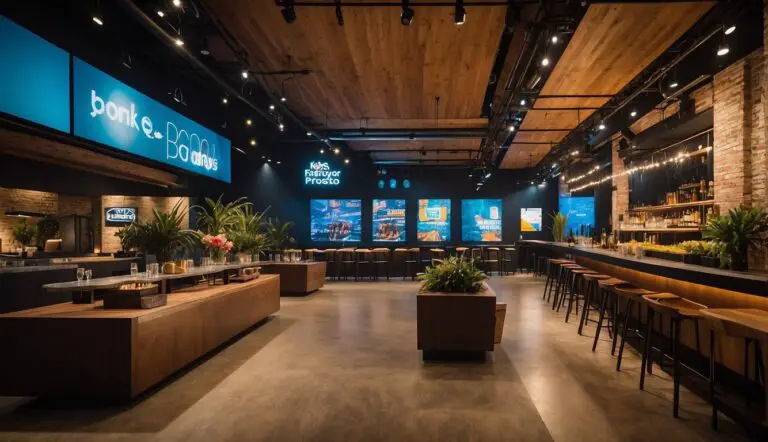As a specialist in the field of event planning, I assure you that my advice on orchestrating corporate events is not only useful but also extremely impactful. The process of planning these occasions involves more than just gathering individuals; it requires the crafting of an experience that is significant and aligns with your corporate goals.
This guide will walk you through the essential steps to plan and execute a corporate event that is not only successful but also memorable.
Key Takeaways for Corporate Event Planning
- Start Early and Set Clear Goals: Begin planning months ahead and establish specific objectives.
- Budget with a Contingency Plan: Allocate resources carefully and include a buffer for unexpected expenses.
- Understand Your Audience: Tailor the event to the attendees’ needs and interests.
- Engage and Interact: Design activities that engage and involve participants.
- Choose the Right Venue: Select a venue that aligns with your event’s goals.
- Effective Marketing: Use various channels to promote your event.
- Manage Logistics Carefully: Pay attention to details for a seamless experience.
- Coordinate Teams Effectively: Ensure clear roles and communication on the event day.
- Evaluate and Learn: Analyze feedback and metrics post-event for improvement.
How to Organize Corporate Events?

Defining the Event’s Purpose and Goals
Determining Your Event’s Direction
Every successful event starts with a clear purpose. Ask yourself, what are we aiming to achieve? Whether it’s building brand awareness, launching a new product, or team bonding, your goals should be Specific, Measurable, Achievable, Relevant, and Time-bound(S.M.A.R.T.).
For instance, if you aim to unveil a new product, your specific goal could be to generate excitement among 500 attendees, with a measurable outcome of 200 follow-up inquiries.
Budget Planning
Allocating Resources Wisely
A well-planned budget is crucial. It’s a balancing act between your financial resources and the envisioned event. Primary expenses include marketing, venue, and entertainment. Remember, a contingency buffer is essential for unforeseen costs.
Understanding Your Audience
Tailoring the Experience to Your Guests
Your event should resonate with its attendees. Understand their needs, motivations, and demographics to tailor the experience. Use surveys and analytics to gather insights. Remember, an event for tech-savvy millennials will differ significantly from one targeting industry veterans.
For more insights on creating memorable corporate events, explore these unique and memorable ways at MemoryCreator.
Detailed Organization for a Successful Corporate Event

Event Design and Engagement
Crafting an Unforgettable Experience
The heart of your event lies in its design and how it engages attendees. Choose a theme that resonates with your audience and focus on creating stand-out content. Workshops, breakout Q&A sessions, and interactive elements can significantly enhance participation. Remember, the goal is to create an experience, not just an event.
Venue Selection
Setting the Perfect Stage
Your venue speaks volumes. Whether it’s an elegant hall or a cutting-edge virtual platform, it should align with your event’s tone and objectives. Consider technical support, food and beverage options, and ease of access for attendees. Factors like Wi-Fi, health, and safety are paramount for in-person events, while virtual venues demand robust tech and customization options.
Marketing and Promotion
Spreading the Word Effectively
Effective marketing is key to ensuring your event is well-attended and anticipated. To create buzz, use a mix of email marketing, social media, and possibly influencer engagement. Your promotional efforts should align with the values and interests of your target audience, whether through fun, engaging campaigns or more informative, thought-provoking content.
Logistics and Coordination
Managing the Nitty-Gritty Details
This step is about the behind-the-scenes work that makes your event run smoothly. Attention to detail is critical, from finalizing the agenda to coordinating with speakers and managing A/V needs. Ensure you have contingency plans for any technical hitches or last-minute changes.
Execution and Team Management
Bringing Your Plan to Life
On the event day, clear communication among team members is crucial. Whether it’s the on-site staff, virtual team, or a combination of both, each member should know their roles and responsibilities. Using tools like Slack or Microsoft Teams can help manage real-time coordination and promptly address any issues.
Post-Event Evaluation
Reflecting on Your Success
Finally, evaluate your event’s impact. Look at metrics like attendance, average time spent, and the participants’ overall satisfaction. Gathering this data is crucial for understanding your event’s success and areas for improvement. Don’t forget to send out thank-you notes and surveys to gather attendee feedback.
Maximizing Attendee Engagement
Creating a Dynamic and Interactive Environment
Engaging your audience is more than just about presenting content; it’s about creating an interactive environment. Consider incorporating live polls, Q&A sessions, and hands-on workshops. These elements keep the audience engaged and contribute to a more memorable experience.
Leveraging Technology for Efficiency and Impact

Utilizing Cutting-Edge Tools
In today’s digital age, technology is pivotal in event planning. From event apps for seamless registration to social media for real-time updates, leveraging the right tech tools can significantly enhance both the planning process and the attendee experience.
Sustainable and Responsible Event Planning
Embracing Eco-Friendly Practices
Sustainability is a growing concern in event planning. Opt for eco-friendly practices like digital invitations, sustainable venue choices, and waste reduction strategies. This will not only reflect well on your company’s values but also appeal to environmentally conscious attendees.
Networking and Relationship Building
Fostering Meaningful Connections
Corporate events are prime networking opportunities. Facilitate this by designing spaces and activities that encourage interaction. This can be as simple as dedicated networking sessions or as innovative as using AI-powered matchmaking tools to connect like-minded attendees.
Measuring ROI and Event Success
Quantifying Your Event’s Impact
It’s crucial to measure ROI to evaluate the success of your event. This includes assessing attendee satisfaction, lead generation, and any uptick in business following the event. These metrics help justify the event’s expense and plan future events.
Post-Event Follow-Up
Maintaining Momentum and Relationships
Post-event engagement is critical. Follow up with attendees through thank-you emails, surveys, and newsletters. This shows appreciation and keeps the conversation going, potentially leading to future business opportunities.
Continuous Improvement in Event Planning
Learning and Evolving from Each Event
Every event is a learning opportunity. Gather feedback, review performance metrics, and identify areas for improvement. Continuous improvement ensures that each subsequent event is more successful than the last.
FAQ – How to Organize Corporate Events
How Early Should I Start Planning a Corporate Event?
Planning Ahead for Success
Start planning at least 3 to 6 months in advance for smaller events, and 6 to 12 months for larger ones. This timeframe allows for venue booking, speaker arrangements, marketing efforts, and managing unexpected challenges.
What Are the Key Elements of a Successful Corporate Event?
Essential Components for Impact
Key elements include a clear objective, a well-defined audience, an appropriate venue, engaging content, effective marketing, meticulous logistics, and robust technology support. Each element plays a critical role in the overall success of the event.
How Do I Determine the Budget for My Event?
Budgeting with Precision
Begin by outlining your event’s goals and requirements. Consider costs for the venue, technology, catering, speakers, marketing, and staffing. Always include a contingency fund for unexpected expenses.
How Can I Ensure High Attendee Engagement?
Captivating Your Audience
Engagement can be boosted through interactive sessions, personalized experiences, networking opportunities, and the use of technology like event apps and social media. Tailoring content to your audience’s interests is key.
What Are the Best Ways to Use Technology in Corporate Events?
Tech-Savvy Event Planning
Utilize event management software for registrations and scheduling. Incorporate live streaming for wider reach, use interactive apps for engagement, and leverage social media for promotion and live updates.
If you enjoyed reading about How to Organize Corporate Events, check out our other articles:
- 20 Client Appreciation Event Ideas 2024 – For Strong Business Bonds
- 6 Corporate Gala Event Ideas 2024: Elevate Your Next Corporate Event
- 6 Fresh Networking Tips for Young Professionals 2024
- Business Event Organization Tips 2024: A Strong Guide for Success
- What To Wear To A Networking Event Women 2024: Dressing for Success
Feel free to also check out our other Articles from the category “Business Events“ and don’t forget to follow us on Pinterest.












